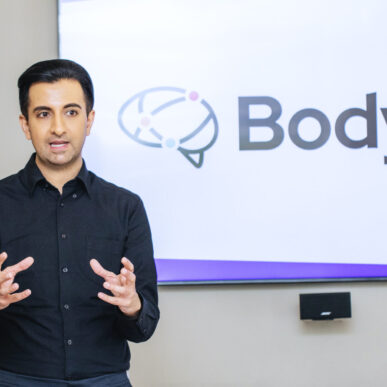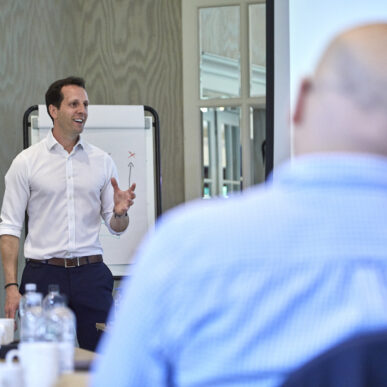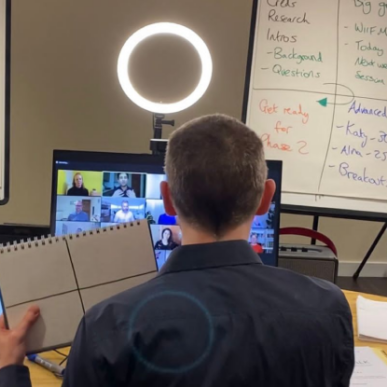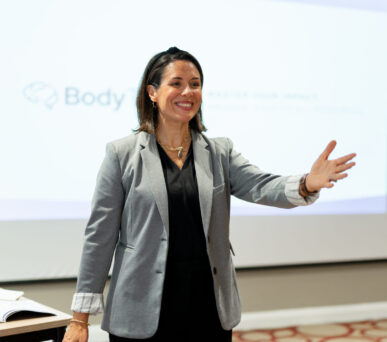How many great presentations have you seen in the last year? How many bad ones have you had to sit through? Most people don’t know what good presentations look like. If you’re lucky, you may have someone on your team with a talent for speaking who you can look up to. Still, mostly, we see colleagues appearing uncomfortable in the conference room or on a Teams call, struggling their way through bullet points, boring the audience and approaching big presentations with the idea of, “This is the way we’ve always done it, so why change?”.
Many people think that speaking is a talent you are born with. Perhaps you feel that speaking isn’t really your strength? Can you change and become a skilled, inspiring speaker?
When Steve Jobs gave a talk in 1984 about the Macintosh computer, he stood behind a lectern and read from notes, looking down. By the time he was launching the iPod, he was telling stories, engaging the audience and owning the stage. He honed his craft, working to improve every detail just as closely as he perfected his products. He transformed from a nervous presenter to one of the best in the business. More on this evolution later.
Talk like TED
In today’s fast-paced world, we are constantly bombarded with information. As a result, attention spans have shortened, and people expect more engaging, dynamic and interactive presentations. This is where TED Talks come in. TED (Technology, Entertainment, Design) Talks quickly became a global sensation for their short yet powerful presentations that captivated audiences with their unique storytelling approach. (Our very own Georgie Palmer took to the stage at TEDx Winchester in 2023.)
By 2009, TED Talks had amassed 100 million views on the Internet. Speakers such as Jill Bolte Taylor and Sir Ken Robinson captivated audiences worldwide with wit, humour and compelling insights. Yet presentations on similar subjects didn’t rise to such lofty heights.
Researchers from ‘Science of People’ decided to find out why. In a study with 760 people watching 15-20 minute talks, they discovered some amazing things:
- People will rate you the same for intelligence, credibility and charisma, whether they have the sound on or off. Of course, you still need to say something worthwhile, and we spend a lot of time working with clients on writing their content, but you must then deliver this in a visually engaging way, or your audience won’t listen or be motivated by you.
- The more gestures you make, the more engaged people become. Researchers found a direct correlation showing that the lowest-viewed TED talks (with an average of 124,000 views) had speakers who made half the number of gestures compared to the highest-viewed talks (with an average of 7,360,000 views at the time of the research). If you are going to stand in front of people, you must visually and emotionally win their attention – gestures help you do both.
- Vocal variety increases credibility and popularity. Speakers with the greatest range of vocal variety scored highest, having 30.5% greater vocal variety than the lowest-rated talks.
Body Talk & UCL Research
You can learn similar skills that will help you succeed at speaking. In 2016, we conducted some groundbreaking research in collaboration with University College London, which was subsequently published in the Journal of Psychology. In a study involving over 2000 participants worldwide, we found that small adjustments to your communication style can significantly increase your influence, regardless of age, race, or gender.
Here’s how it worked: We created 100 videos featuring four actors of different demographics, maintaining consistency in clothing and words. The key variable was non-verbal cues, such as posture and gestures. Surprisingly, age, gender, and ethnicity did not impact viewers’ ratings. What mattered was the presentation style’s effectiveness – specifically, the posture and gesture insights we teach. The presenters using these techniques in our videos increased the audience’s perceptions of their knowledge and confidence by up to 42%.
This stunning insight reveals it’s not just what you say but how you say it that can compel an audience to engage and listen to your message. In essence, the research demonstrates that anyone can significantly enhance their influence by slight adjustments to body language and non-verbal cues when delivering presentations.
Theory into practice
So, that’s the theory, but how do you apply it and raise the game for your presentations? Here are some tips to get you started:
- Enhance Your Posture:
Great posture is foundational to a compelling presentation. Position your feet shoulder-width apart, distributing your weight evenly. Keep your shoulders back but relaxed and your chin parallel to the ground. This stance conveys confidence and openness, making you appear more engaging and trustworthy to your audience. Consider a similar approach when sitting down, with your back straight and feet planted firmly on the ground.
- Use Purposeful Gestures:
Gestures are powerful tools to enhance your message and connect with your audience. Consider the following:
Palms Down for Emphasis: When emphasising key points or delivering serious messages, use palms facing down. This gesture adds gravity to your words and underscores importance.
Palms Up for Openness: Palms Up for Openness: To convey openness and warmth, or when posing a question, use palms facing up.
Balanced Gestures: Strike a balance between dominant and submissive gestures. A mix of gestures ensures your presentation is dynamic, engaging, and aligns with the emotional tone of your content.
- Be Congruent:
Congruency between your verbal and non-verbal cues is essential for credibility.
Consistent Tone: Align your tone of voice with the message you’re conveying. A consistent tone ensures that your verbal and non-verbal cues reinforce each other.
Match Body Language to Message: Adapt your body language to the content. Express enthusiasm through open gestures for positive messages, and use controlled, measured movements for serious topics.
Avoid Contradictions: Inconsistencies between what you say and how you say it can erode trust. Ensure your body language supports and reinforces your spoken words to maintain authenticity.
The Evolution of Steve Jobs
Earlier, we mentioned how Steve Jobs transformed his presentation approach. Adopting the ideas above certainly helped, but there were other things he did to elevate his delivery.
He read from his notes in his early presentations, factually delivering information. However, a pivotal shift occurred as he evolved into a master storyteller. Jobs recognized the power of narratives to captivate emotions and connect with the audience on a profound level.
The Power of Anecdotes
Jobs seamlessly integrated anecdotes into his presentations, transforming technical details into relatable and compelling stories. Whether recounting the journey of Apple or narrating personal experiences, he painted vivid pictures that resonated with his audience. This transition from dry data to engaging stories became a hallmark of his presentations.
Creating Emotional Resonance
Jobs understood that stories have the ability to evoke emotions. Instead of relying solely on product features, he crafted narratives that tapped into the aspirations and desires of the audience. By infusing his presentations with emotion, he elevated the connection between Apple’s products and the consumers.
Visual Storytelling
In addition to verbal storytelling, Jobs leveraged visual elements to enhance the narrative impact. His iconic slides featured minimalistic design, impactful images, and concise text, providing a visual complement to the spoken narrative. This harmonious blend of verbal and visual storytelling reinforced the key messages and left a lasting impression.
Connection through Authenticity
Authenticity was at the core of Jobs’ stage presence. He didn’t conform to a prescribed formula but embraced his unique style. His vulnerability, passion, and unwavering belief in his message created a genuine connection with the audience. Jobs showed that owning the stage is not about adopting a one-size-fits-all approach but about being true to oneself.
Actionable Steps:
Craft Compelling Narratives:
- Identify key messages and translate them into engaging stories.
- Use anecdotes to make your content relatable and memorable.
Infuse Emotion into Presentations:
- Understand your audience’s aspirations and emotions.
- Connect with your audience on a human level by incorporating emotional elements.
Visual Harmony:
- Design slides that complement and enhance your spoken narrative.
- Use visuals sparingly and purposefully to reinforce key points.
Dynamic Stage Presence:
- Practice controlled movements and gestures that align with your message.
- Experiment with pacing, pauses, and tonal variations to maintain audience engagement.
Authenticity Matters:
- Be genuine and true to your own style.
- Embrace vulnerability and passion to establish an authentic connection with your audience.
Remember that the journey to becoming a skilled, inspiring speaker is not a solitary one. Embrace the wisdom from TED Talks, learn from the evolution of Steve Jobs, follow us on social media and integrate the actionable steps into your presentations. In doing so, you embark on a transformative path where authenticity, storytelling, and visual harmony converge to create presentations that resonate, captivate, and leave a lasting impact. So, step onto the stage with confidence, knowing that the power to inspire lies within all of us, not just a lofty few.




















